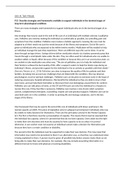Essay
Unit 14- Task 4
- Course
- Institution
- Book
P11- Describe strategies and frameworks available to support individuals in the terminal stages of long-term physiological conditions M4- Describe moral and ethical conflicts surrounding end of life care D3- Summarise potential ethical and moral conflicts between individual choice and wider socie...
[Show more]




